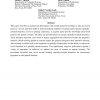101 search results - page 13 / 21 » A Learning Architecture for the Game of Go |
137
click to vote
AIIDE
2008
15 years 4 months ago
2008
The quality of AI opponents often leaves a lot to be desired, which poses many attractive challenges for AI researchers. In this respect, Turn-based Strategy (TBS) games are of pa...
103
click to vote
ATAL
2003
Springer
15 years 7 months ago
2003
Springer
Research in multi-agent systems has led to the development of many multi-agent control architectures. However, we believe that there is currently no known optimal structure for mu...
114
click to vote
CONSTRAINTS
1998
15 years 1 months ago
1998
This paper describes an architecture that begins with enough general knowledge to play any board game as a novice, and then shifts its decision-making emphasis to learned, game-sp...
128
click to vote
ICANN
2009
Springer
15 years 6 months ago
2009
Springer
Learning to solve small instances of a problem should help in solving large instances. Unfortunately, most neural network architectures do not exhibit this form of scalability. Our...
122
click to vote
AGI
2011
14 years 5 months ago
2011
We present an architectural approach to learning problem solving skills from demonstration, using internal models to represent problem-solving operational knowledge. Internal forwa...

